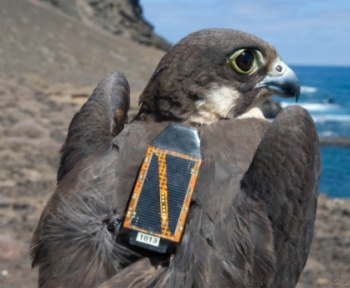STMicroelectronics, a global semiconductor leader serving customers across the spectrum of electronics applications and the world’s top manufacturer of MEMS (Micro-Electro-Mechanical Systems)1 , and the University of Amsterdam (UvA) Faculty of Science have announced that a sophisticated bird-tracking system developed by the university is using advanced MEMS sensing technology from ST.

Weighing as little as a 20 euro cent coin or a US quarter and smaller than a car key so as not to impede the birds’ flight, the tracking systems are sophisticated data loggers that can be attached to the back of the birds. The trackers enable valuable scientific research on bird behavior by measuring GPS position every 3 seconds.
In addition to the bird’s location, determined via the Global Positioning System, the tracker collects acceleration and direction data from STMicroelectronics’ LSM303DLM digital compass that integrates low-power, high-performance motion and magnetic sensing in a miniature form factor. The MEMS chip monitors the direction and vertical/horizontal orientation of the animal and can determine the body angle of birds flying in a crosswind.
The tracker also contains sensors that measure both the air temperature and the internal temperature of the device. A lithium battery, charged by a high-efficient triple-junction solar cell, provides power to the system, and a ZigBee transceiver manages wireless data communication to and from the device.
Data from the trackers is currently being shared among bird-research institutes and biologists to verify computer models that predict bird behavior and migration patterns (www.UvA-BiTS.nl).
“MEMS technologies are finding their way into a broad range of applications and only ST has the breadth of technologies available to serve as a one-stop supplier,” said Benedetto Vigna, Executive Vice President and General Manager of ST’s Analog, MEMS and Sensors Group. “The light weight, low power, and high accuracy of the MEMS make it ideal for innovative projects like UvA’s bird tracking system to study avian migration and behavior.”
“Animals have a lot to teach us and, especially as the Earth’s climate changes, there are many projects that we can undertake to study animal behavior and migration patterns,” said Prof. Dr. Ir. Willem Bouten of UvA. “STMicroelectronics is a strong partner for us in developing technologies that are suitable and adaptable to researching challenging problems that could help us address the effects of global warming and land use change.